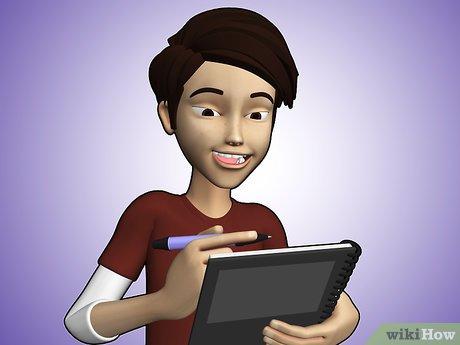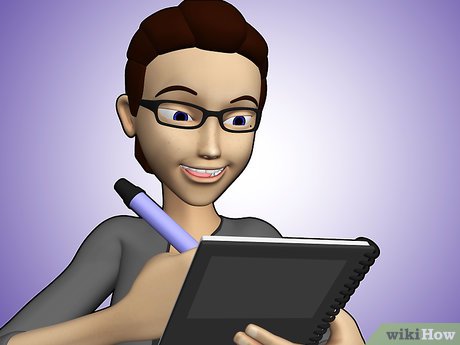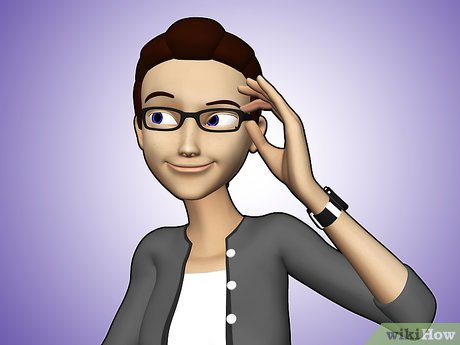How to Be Able to Create a Story
Method 1 of 2:
Creating a Basic Story
-
 Decide on the topic you want to write about. Your work can be about whatever you want it to be. You could try a traditional genre, or you could make up your own, unique genre.[1]
Decide on the topic you want to write about. Your work can be about whatever you want it to be. You could try a traditional genre, or you could make up your own, unique genre.[1] -
 Come up with characters for your story. You'll want a main character or characters, people with whom they are friends and with whom they are enemies. If there is a main antagonist (often considered a bad guy) come with them too.[2]
Come up with characters for your story. You'll want a main character or characters, people with whom they are friends and with whom they are enemies. If there is a main antagonist (often considered a bad guy) come with them too.[2]- Authors find that actually planning the entire story, though it may take months, is beneficial to creating a smooth, connected story. Developing your characters is important, and conveying them correctly in your work is even more so.
-
 Show, don't tell. When writing, don't tell your readers everything you planned abruptly (although the occasional telling is fine). Instead, show them. The readers can figure out your characters' personalities better when they observe the characters' to reactions to different situations.[3]
Show, don't tell. When writing, don't tell your readers everything you planned abruptly (although the occasional telling is fine). Instead, show them. The readers can figure out your characters' personalities better when they observe the characters' to reactions to different situations.[3]- For example: your main character, Mary, is very smart (according to your planning). Don't write, "Mary was a very smart woman;" write, "Mary always stayed in the library for hours, picking through reference book after reference book, unable to decide what she was going to study today." The latter lets the reader pick up on the fact that Mary is smart without you force feeding it to them.
-
 Make sure you are able to set the story in a setting. Try to come up with a setting that the reader can find believable, and one that makes sense, even if it's a fantastical setting, it should have elements that ground it in reality. Try to make it sound like a place that someone would want to read about. Make up your own town or state if you want.
Make sure you are able to set the story in a setting. Try to come up with a setting that the reader can find believable, and one that makes sense, even if it's a fantastical setting, it should have elements that ground it in reality. Try to make it sound like a place that someone would want to read about. Make up your own town or state if you want.- For example: Harry Potter has a very fantastical setting, but the idea of school, politics, and the importance of friends and family are very real and very universal and make the fantastical elements feel more realistic.
-
 Lay out your plot in an organized way. Use an outline or some other form of organization to keep your plot straight. Then, when you write, all you have to do is look at the outline.
Lay out your plot in an organized way. Use an outline or some other form of organization to keep your plot straight. Then, when you write, all you have to do is look at the outline. -
 Keep writing. Unless you plan on changing your story completely, don't touch what you've already written. Once your story comes to a close, then you start at the beginning and work your way through the book, changing little segments, adding characters' back stories, etc.
Keep writing. Unless you plan on changing your story completely, don't touch what you've already written. Once your story comes to a close, then you start at the beginning and work your way through the book, changing little segments, adding characters' back stories, etc.
Method 2 of 2:
Creating Stories from Real Life
-
 People watch. Spend time in public places, surreptitiously watching people and making up stories for them. Write down descriptions of their appearance, their mannerisms, their voices, what they were saying and what they were doing. Then take those stories and make them longer and more intricate.[4]
People watch. Spend time in public places, surreptitiously watching people and making up stories for them. Write down descriptions of their appearance, their mannerisms, their voices, what they were saying and what they were doing. Then take those stories and make them longer and more intricate.[4]- Put people that you see into the same story, even if they aren't interacting in real life.
-
 Talk to strangers. Obviously be safe while doing this, but talk to random people. Get insights into their lives and what they're doing. Even a simple discussion about the weather can give you insight into a person.
Talk to strangers. Obviously be safe while doing this, but talk to random people. Get insights into their lives and what they're doing. Even a simple discussion about the weather can give you insight into a person.- Do they mumble? Do they meet your eye or do they look anywhere but you? How is their body language?

- Using what you've observed, write a story about them, using the mannerisms and descriptions that you've noticed about them.
- Do they mumble? Do they meet your eye or do they look anywhere but you? How is their body language?
-
 Scour the phone book. You will find the most amazing and bizarre names in the phone book. Look through it and pick out the best ones. Write stories with characters based on the names that you've discovered.
Scour the phone book. You will find the most amazing and bizarre names in the phone book. Look through it and pick out the best ones. Write stories with characters based on the names that you've discovered. -
 Read nonfiction. The best stories do seem to come from real life events and experiences (as they say "Truth is stranger than fiction") so read lots of nonfiction, especially if you're a fiction writer. Read histories of all different countries and time periods and build stories based on the things that happen. Read science books and medical books. Read about seafarers, and potential witches.[5]
Read nonfiction. The best stories do seem to come from real life events and experiences (as they say "Truth is stranger than fiction") so read lots of nonfiction, especially if you're a fiction writer. Read histories of all different countries and time periods and build stories based on the things that happen. Read science books and medical books. Read about seafarers, and potential witches.[5]- Pick out the facts and things that most interest you and build stories based on them. For instance, you could take something as simple as a decommissioned lighthouse in Maine and turn it into an epic tale of good and evil.
Share by
David Pac
Update 24 March 2020










